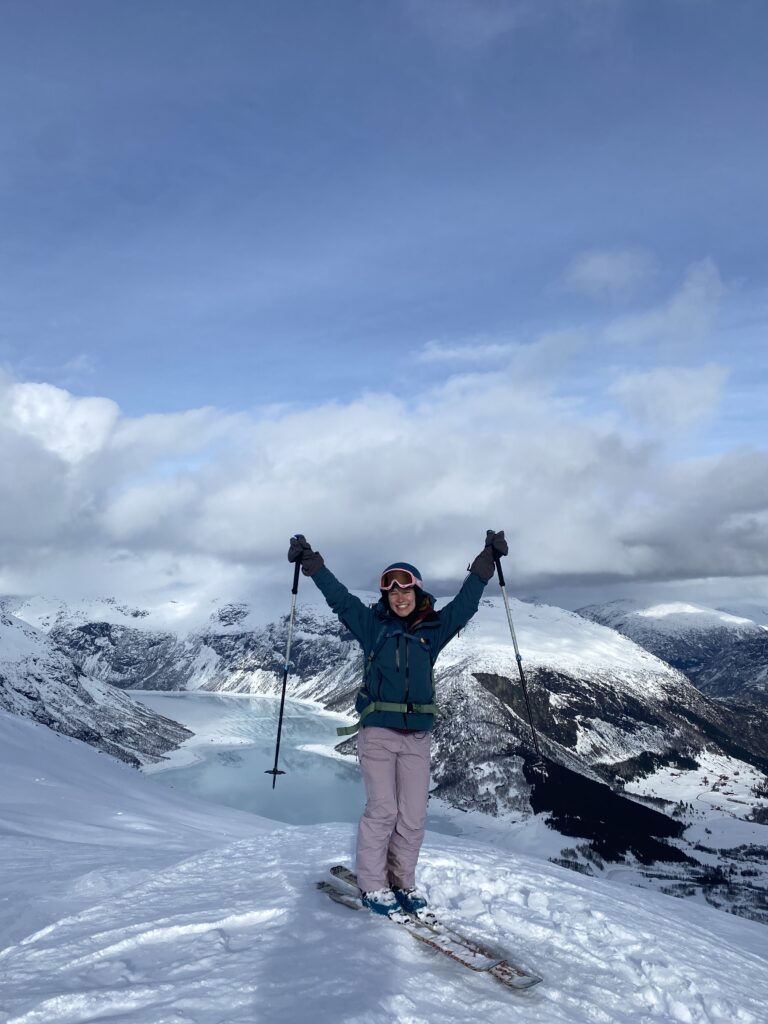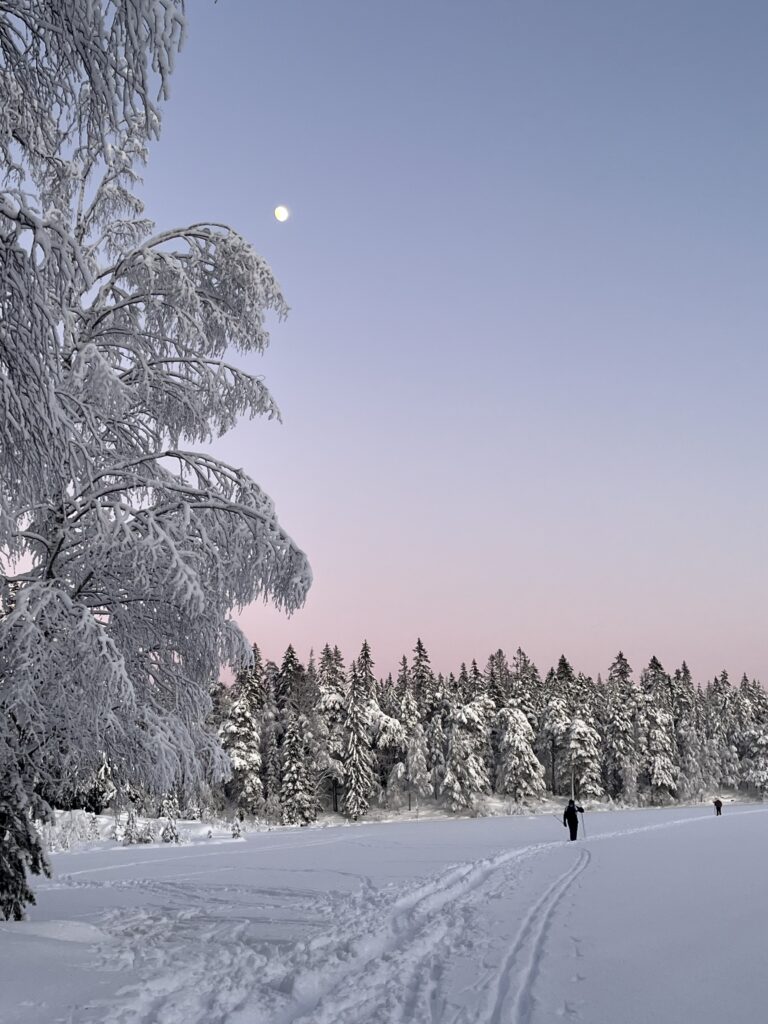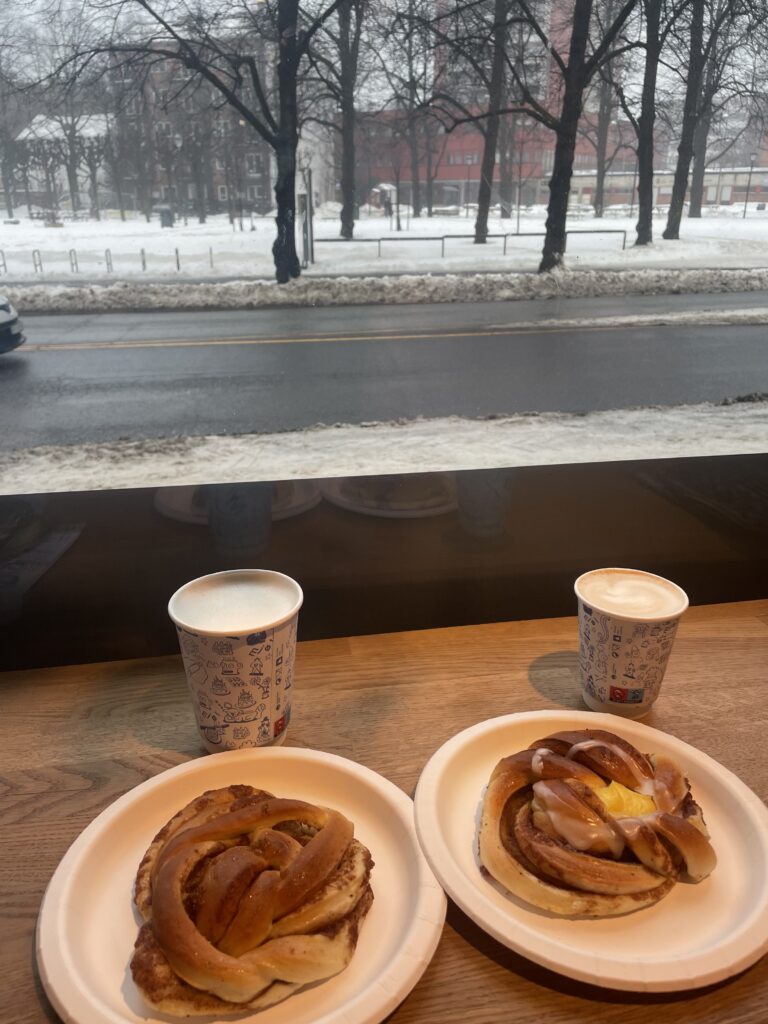Vera: my exchange semester in Oslo (NOR)

“Juicy Cinnamonbuns, Friluftsliv & Unlimited Trust” – My Erasmus Semester at Oslo Met & NTG‑U Bærum
(February 2025 – June 2025)
The University – Oslo Metropolitan University (OsloMet)
Landing at OsloMet felt like stepping into the future: huge, light‑filled buildings, an app that guides you to every room, quiet study niches on every floor, and — best of all — a free gym membership for Erasmus students. My original study programme was cancelled just weeks before arrival, so I pivoted into three block courses designed exclusively for Erasmus students. We were only ten in total, which meant plenty of discussion time with the lecturers. OsloMet’s digital learning platform was intuitive and the canteen served good (and affordable!) food — pro‑tip: never miss “Kanelbolle Wednesday.”
Practice & Internship – NTG‑U Bærum Sports School
Alongside writing my master’s thesis, I completed an internship at NTG‑U Bærum, a sports‑focused lower‑secondary school. Imagine teaching in a place where the staff kitchen is the social hub, students address teachers by first name, and crosscountry–skis leaning against lockers are perfectly normal. The communication style was flat, friendly, and empowering; lesson plans were frameworks rather than straight‑jackets. Compared with the often rule‑bound Austrian system, this low‑pressure environment let me experiment, support pupils individually, and genuinely enjoy eight‑hour school days that somehow flew by.
Accommodation
I shared a flat with my boyfriend, which removed most housing stress but not Oslo’s price tags. SiO Housing fills up fast, so apply early and aim for Kringsjå Student Village — steps from the forest and the Sognsvann lake ski tracks. Rent is alright there and waking up next to Nordic nature is worth every krone.
City Life – Winter Hygge & Endless Spring Days
- Winter: Oslo shrinks into candle‑lit cafés and the aroma of fresh kanelboller. Everywhere you look someone is carrying cross‑country skis. Floating fjord saunas offer the ultimate warm‑cold‑warm routine. My highlights were multi‑day hut‑to‑hut crosscountry-trips (DNT cabins – get the membership!) and joining OSI Friluft (the university outdoor club) for skitouring-trips. Also renting free sports equipment at BUA and going iceskating on the free icerinks or on the frozen fjord is a special!
- Spring: Rain, then suddenly 18 °C and sun until midnight. The city explodes: picnics at Frognerparken, tourists along the Opera House promenade, locals queued for soft‑ice. My highlights were kayaktrips on the fjord, beers (superexpensive ones) at åkerbrygge or taking the ferry to the island right in front of Oslo (Included in the monthly bus-ticket – App: RUTER).
Cultural Highlights – Tillit, Janteloven & Friluftsliv
- Tillit (Trust): Norway runs on trust. Unmanned cabins stock food you pay for later online; shops rely on self‑checkout; second‑hand deals on Finn.no or Tise.no work because no one expects to be cheated. BUA rents out free sports equipment and I felt safe at any hour, anywhere in the city.
- Janteloven: The unwritten rule that no one is better than anyone else shows up in everyday humility — from professors using first names to Olympic athletes or politicians or members of the king-family riding the metro next to you.
- Friluftsliv: Outdoor life is a birth‑right. The saying “There’s no bad weather, only bad clothes” is a real social contract, so pack ull‑layers (wool) plus a shell jacket and you’re good to go. Friday after class, half the city disappears into the forest with skis or hiking boots. I you haven’t seen it you wouldn’t believe how many people participate at the outdoor life at any weather. People running to work, skiing before work, training between university classes – little kids, grandparents. Everyone is doing sports and moving outdoors!
- Second‑hand culture: With a flourishing reuse market (UFF thrift shops, Tise.no, Finn.no, annual fleamarkets at all schools), you can kit yourself out sustainably and cheaply — and confidently, because sellers are to be trusted in Norway!

Reflections & Take‑aways
Culturally & socially, I experienced Norway’s paradox of pace: everything runs on time, yet nobody seems rushed. Immersing myself in the trust economy (tillit)—from self‑checkout supermarkets to unmanned mountain cabins—proved that rules work best when anchored in mutual respect rather than surveillance.
Personally & professionally, the exchange strengthened my adaptability muscle. Responding to a last‑minute programme cancellation, thriving in a new sports school, and forging friendships through outdoor clubs sharpened my communication skills and broadened my network. Most of all, it rekindled my passion for learner‑centred teaching in low‑hierarchy settings.
In short, I arrived curious and cautious; I leave as a more agile, trust‑driven educator ready to pass on a touch of Norwegian ingen stress wherever I teach next.
Why It Matters for My Future Classroom
I will bring home:
- Transparency: starting each term with a clear overview of expectations and milestones.
- Low‑hierarchy dialogue: inviting pupils to negotiate learning paths.
- Trust culture: giving students responsibility—and trusting them to handle it.
How the Experience Changed Me
I arrived curious; I left confident, adaptable, and infinitely more open‑minded. Seeing a completely different school system broke the “this‑is‑how‑we‑always‑do‑it” mindset. Now, when someone says “That’s impossible,” I think of Oslo’s seamless digital bureaucracy, teachers sipping coffee together at 07:55, and teenagers skating off to class—no stress, everything still gets done.
Practical Tips for Future Erasmus Students
- Apply for SiO housing early.
- Pack a thermos, wool base layers, and a waterproof shell.
- Buy gear second‑hand on Finn.no or Tise.no or at UFF—cheap, sustainable, and trustworthy.
- Join a university sport club (OSI) —friendships happen faster on a trail than in a lecture hall.
- Treat yourself to a kanelbolle at least once a week; it’s practically cultural research.
I wholeheartedly encourage everyone to take an internship abroad. We cannot discover the best ways to teach if we never look beyond our own “Tellerrand”.

Text und Fotos: Chiusole, Vera
